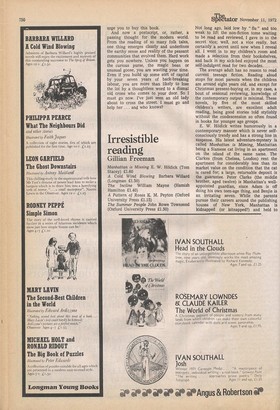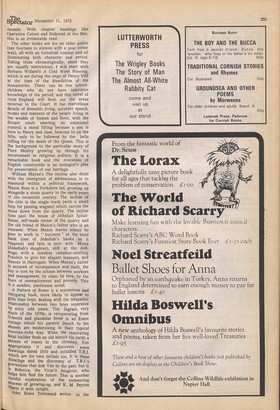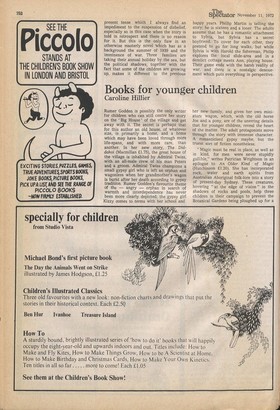Irresistible reading
Gillian Freeman
Manhattan is Missing E. W. Hildick (Tom Stacey) £1.60
A Cold Wind Blowing Barbara Willard (Longman £1.50) The Incline William Mayne (Hamish Hamilton £1.40) A Pattern of Roses K. M. Peyton (Oxford University Press £1.15) The Summer People John Rowe Townsend (Oxford University Press £1.50) Not long ago, laid low by " flu " and too weak to lift the non-fiction tome waiting to be read and reviewed, I gave in to the secret vice; well, not a vice really, but certainly a secret until now when I reveal all. I went in to my children's room and made a selection from their bookshelves, and back in my sick-bed enjoyed the most self-indulgent read for two decades.
The average adult has no reason to read current teenage fiction. Reading aloud stops for most parents when the children are around eight years old, and except for Christmas present-buying or, in my case, a bout of seasonal reviewing, knowledge of the contemporary output is minimal. These novels, by five of the most skilled children's writers, are excellent adult reading, being good stories told stylishly without the condescension so often found in books for younger age groups.
E. W. Hildick writes humorously in a contemporary manner which is never selfconsciously trendy and has a strong line in suspense. His latest adventure-mystery is called Manhattan is Missing, Manhattan being a Siamese cat living in an apartment on the island of the same name. The Clarkes (from Chelsea, London) rent the apartment for considerably less than its market value on the condition that the cat is cared for; a large, returnable deposit is the guarantee. Peter Clarke (the middle brother, aged twelve) is Manhattan's wellappointed guardian, since Adam is off doing his own teen-age thing, and Benjie is an irritating seven. While the parents pursue their careers around the publishing houses of New York, Manhattan is kidnapped (or kitnapped?) and held to ransom. With chapter headings like Operation Catnet and Stakeout at the Met, this is an irresistable read.
The other books are for an older public (say fourteen to sixteen with a year either way), all with an historical content and all illuminating both character and period. Taking them chronologically, since they are equally meritorious, I will start with Barbara Willard's A Cold Wind Blowing, which is set during the reign of Henry VIII at the time of the dissolution of the monasteries. There can be few schoolchildren who do not have television knowledge of the period, and this novel of rural England will flesh out the areas external to the Court. It has marvellous details of domestic living, accurate speech, modes and manners of the people living in the wealds of Sussex and Kent, with the distant court exerting an emotional control; a mood lifting because a son is born to Henry and Jane, beacons lit on the hills, only to be followed by the bells tolling for the death of the Queen. This is the background to the particular story of Piers Medley growing up through his involvement in religious politics. It is a remarkable book and the evocation of English countryside is an ecologist's plea for preservation of our heritage.
William Mayne's The Incline also deals With the emergence of adolescence in to manhood within a political framework.
Mason Ross is a Yorkshire lad, growing up alongside a stone quarry in the early years of the twentieth century. The incline of the title is the single track (with a small loop for passing wagons) which carries the stone down from the quarry. The incline runs past the house of Jedediah Spitalhouse, self-made owner of the quarry and the old friend of Mason's father who is an overseer. When Mason leaves school he goes to work in " business" at the local bank (one of Jedediah's banks as it happens) and falls in love with Moira (Jedediah's daughter), still at the doll.
Stage, with a resident camphor-smelling Fraulein to give her elegant manners, and lessons in Harrogate. When Mason's father Is accused of incompetence and, theft, the boy is torn by the schism between workers and management, by class, by love, by the fears of unemployment and poverty. This is a sombre, passionate novel.
A Pattern of Roses is a mysterious and intriguing book, more likely to appeal to girls than boys, dealing with the telepathic relationship between two boys separated by sixty odd years. Tim Ingram, very Much of the 1970s, is recuperating from
0-levels and glandular fever in an Essex cottage which his parents (much to his
Shame) are modernising in their typical nouveau-riche way. When the renovating local builder finds an old biscuit tin (with a Pattern of roses) in the chimney, Tim appropriates it and discovers some drawings dated 1910 and initialled T.R.I. Which are his own initials too. It is these drawings and the discovery of T.R.1.'s gravestone that link Tim to the past, but it
Is Rebecca, the Vicar's daughter, who helps him find the future. This is another careful exploration of the tormenting Process of growing-up, and IC. M. Peyton Charts it with insight.
John Rowe Townsend writes in the present tense which I always find an impediment to the suspension of disbelief, especially so in this case when the story is told in retrospect and there is no reason for it. But this is the only flaw in an otherwise masterly novel which has as a background the summer of 1939 and the imminence of war. Three families are taking their annual holiday by the sea, but the political shadows, together with the fact that some of the children are growing up, makes it different to the previous happy years. Phillip Martin is telling the story; he is sixteen and, a loner. The adults assume that he has a romantic attachment to Sylvia, but Sylvia has a secret boyfriend. To cover for each other, they pretend to go for long walks, but while Sylvia is with Harold the fisherman, Philip explores the local slide-area and in a derelict cottage meets Ann, playing house. Their game ends with the harsh reality of war, and there is a nostalgic denouement which puts everything in perspective.




















































 Previous page
Previous page